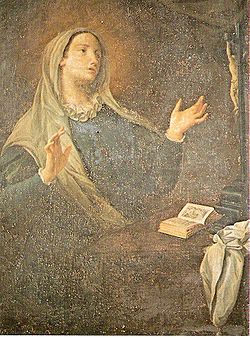The Novena for Holy Souls in Purgatory, Day 9
composed by by St. Alphonsus of Liguori
[powerpress]
My God! How was it possible that I, for so many years, have borne tranquilly the separation from Thee and Thy holy grace! O infinite Goodness, how long-suffering hast Thou shown Thyself to me! Henceforth, I shall love Thee above all things. I am deeply sorry for having offended Thee; I promise rather to die than to again offend Thee. Grant me the grace of holy perseverance, and do not permit that I should ever again fall into sin. Have compassion on the holy souls in Purgatory. I pray Thee, moderate their sufferings; shorten the time of their misery; call them soon unto Thee in heaven, that they may behold Thee face to face, and forever love Thee. Mary, Mother of Mercy, come to their aid with thy powerful intercession, and pray for us also who are still in danger of eternal damnation.
Say the following prayers: 1 Our Father… 1 Hail Mary… The Prayer to Our Suffering Saviour for the Holy Souls in Purgatory found below.
Visit the Discerning Hearts “Holy Souls†page for the complete novena and text of the prayers
Tags: catholic, catholic podcast, catholic prayer, cathollc spirituality, heaven, holy souls, holy souls in purgatory, intercession, prayers, purgatory, sin, souls in purgatory
This entry was posted on Saturday, November 1st, 2014 at 12:01 am
You can follow any responses to this entry through the RSS 2.0 feed.
The Novena for Holy Souls in Purgatory, Day 8
composed by by St. Alphonsus of Liguori
[powerpress]
Oh my God! I also am one of these ungrateful beings, having received so much grace, and yet despised Thy love and deserved to be cast by Thee into hell. But Thy infinite goodness has spared me until now. Therefore, I now love Thee above all things, and I am heartily sorry for having offended Thee. I will rather die than ever offend Thee. Grant me the grace of holy perseverance. Have compassion on me and, at the same time, on the holy souls suffering in Purgatory.
Say the following prayers: 1 Our Father… 1 Hail Mary… The Prayer to Our Suffering Saviour for the Holy Souls in Purgatory found below.
Visit the Discerning Hearts “Holy Souls†page for the complete novena and text of the prayers
Tags: catholic, catholic podcast, catholic prayer, cathollc spirituality, hell, holy souls, holy souls in purgatory, prayers, purgatory, souls in purgatory, suffering
This entry was posted on Friday, October 31st, 2014 at 12:47 am
You can follow any responses to this entry through the RSS 2.0 feed.
The Novena for Holy Souls in Purgatory, Day 7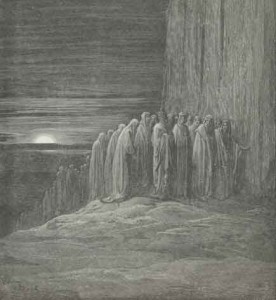
composed by by St. Alphonsus of Liguori
[powerpress]
God, Father of Mercy, satisfy this their ardent desire! Send them Thy holy Angel to announce to them that Thou, their Father, are now reconciled with them through the suffering and death of Jesus, and that the moment of their deliverance has arrived.
Say the following prayers: 1 Our Father… 1 Hail Mary… The Prayer to Our Suffering Saviour for the Holy Souls in Purgatory found below.
Visit the Discerning Hearts “Holy Souls†page for the complete novena and text of the prayers
Tags: catholic, catholic podcast, catholic prayer, cathollc spirituality, death, holy souls in purgatory, Jesus, prayers, purgatory, souls in purgatory, suffering
This entry was posted on Thursday, October 30th, 2014 at 12:03 am
You can follow any responses to this entry through the RSS 2.0 feed.
The Novena for Holy Souls in Purgatory, Day 6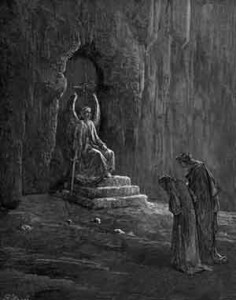
composed by by St. Alphonsus of Liguori
[powerpress]
My Divine Redeemer, Thou didst die for me on the Cross, and hast so often united Thyself with me in Holy Communion, and I have repaid Thee only with ingratitude. Now, however, I love Thee above all things, O supreme God; and I am more grieved at my offences against Thee than at any other evil. I will rather die than offend Thee again. Grant me the grace of holy perseverance. Have compassion on me, and, at the same time, on the holy souls suffering in Purgatory. Mary, Mother of God, come to their aid with thy powerful intercession
Say the following prayers: 1 Our Father… 1 Hail Mary… The Prayer to Our Suffering Saviour for the Holy Souls in Purgatory found below.
Visit the Discerning Hearts “Holy Souls†page for the complete novena and text of the prayers
Tags: catholic, catholic podcast, catholic prayer, cathollc spirituality, evil, holy souls, holy souls in purgatory, intercession, prayers, purgatory, souls in purgatory, suffering
This entry was posted on Wednesday, October 29th, 2014 at 12:07 am
You can follow any responses to this entry through the RSS 2.0 feed.
The Novena for Holy Souls in Purgatory, Day 5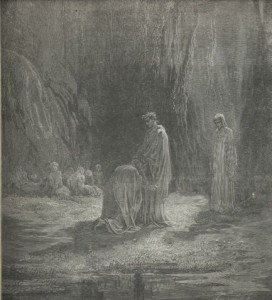
composed by by St. Alphonsus of Liguori
[powerpress]
Woe to me, unhappy being, if Thou, O Lord, hadst cast me into hell; for from that dungeon of eternal pain there is no deliverance. I love Thee above all things, O infinite God and I am sincerely sorry for having offended Thee again. Grant me the grace of holy perseverance. Have compassion on me, and, at the same time, on the holy souls suffering in Purgatory. O Mary, Mother of God, come to their assistance with thy powerful intercession.
Say the following prayers: 1 Our Father… 1 Hail Mary… The Prayer to Our Suffering Saviour for the Holy Souls in Purgatory found below.
Visit the Discerning Hearts “Holy Souls†page for the complete novena and text of the prayers
Tags: catholic, catholic podcast, catholic prayer, cathollc spirituality, hell, holy souls, holy souls in purgatory, intercession, purgatory, souls in purgatory, suffering
This entry was posted on Tuesday, October 28th, 2014 at 12:03 am
You can follow any responses to this entry through the RSS 2.0 feed.
The Novena for Holy Souls in Purgatory, Day 4
composed by by St. Alphonsus of Liguori
[powerpress]
My God! because Thou art infinite goodness, I am sorry with my whole heart for having offended Thee. I promise to die rather than ever offend Thee more. Give me holy perseverance; have pity on me, and have pity on those holy souls that burn in the cleansing fire and love Thee with all their hearts. O Mary, Mother of God, assist them by thy powerful prayers.
Say the following prayers: 1 Our Father… 1 Hail Mary… The Prayer to Our Suffering Saviour for the Holy Souls in Purgatory found below.
Visit the Discerning Hearts “Holy Souls†page for the complete novena and text of the prayers
Tags: catholic, catholic podcast, catholic prayer, cathollc spirituality, heart, hearts, holy souls, holy souls in purgatory, poor souls, prayers, purgatory, souls in purgatory
This entry was posted on Monday, October 27th, 2014 at 12:02 am
You can follow any responses to this entry through the RSS 2.0 feed.
The Novena for Holy Souls in Purgatory, Day 3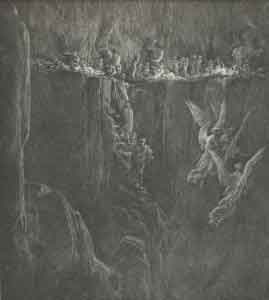
composed by by St. Alphonsus of Liguori
[powerpress]
My God! because Thou art infinite goodness, I love Thee above all things, and repent with my whole heart of my offenses against Thee. Grant me the grace of holy perseverance. Have compassion on me, and, at the same, on the holy souls suffering in Purgatory. And thou, Mary, Mother of God, come to their assistance with thy powerful intercession.
Say the following prayers: 1 Our Father… 1 Hail Mary… The Prayer to Our Suffering Saviour for the Holy Souls in Purgatory found below
Visit the Discerning Hearts “Holy Souls†page for the complete novena and text of the prayers
Tags: catholic, catholic podcast, catholic prayer, cathollc spirituality, heart, holy souls, holy souls in purgatory, intercession, prayers, purgatory, souls in purgatory, st alphonsus
This entry was posted on Sunday, October 26th, 2014 at 12:06 am
You can follow any responses to this entry through the RSS 2.0 feed.
VATICAN CITY, 12 JAN 2011 (vatican.va) –
Dear Brothers and Sisters,
After Catherine of Siena and Catherine of Bologna, today I would like to speak to you about another Saint: Catherine of Genoa, known above all for her vision of purgatory. The text that describes her life and thought was published in this Ligurian city in 1551. It is in three sections: her Vita [Life], properly speaking, the Dimostratione et dechiaratione del purgatorio — better known as Treatise on purgatory — and her Dialogo tra l’anima e il corpo (cf. Libro de la Vita mirabile et dottrina santa, de la beata Caterinetta da Genoa. Nel quale si contiene una utile et catholica dimostratione et dechiaratione del purgatorio, Genoa 1551). The final version was written by Catherine’s confessor, Fr Cattaneo Marabotto.
Catherine was born in Genoa in 1447. She was the youngest of five. Her father, Giacomo Fieschi, died when she was very young. Her mother, Francesca di Negro provided such an effective Christian education that the elder of her two daughters became a religious.
When Catherine was 16, she was given in marriage to Giuliano Adorno, a man who after various trading and military experiences in the Middle East had returned to Genoa in order to marry.
Married life was far from easy for Catherine, partly because of the character of her husband who was given to gambling. Catherine herself was at first induced to lead a worldly sort of life in which, however, she failed to find serenity. After 10 years, her heart was heavy with a deep sense of emptiness and bitterness.
A unique experience on 20 March 1473 sparked her conversion. She had gone to the Church of San Benedetto in the monastery of Nostra Signora delle Grazie [Our Lady of Grace], to make her confession and, kneeling before the priest, “receivedâ€, as she herself wrote, “a wound in my heart from God’s immense loveâ€. It came with such a clear vision of her own wretchedness and shortcomings and at the same time of God’s goodness, that she almost fainted.
Her heart was moved by this knowledge of herself — knowledge of the empty life she was leading and of the goodness of God. This experience prompted the decision that gave direction to her whole life. She expressed it in the words: “no longer the world, no longer sin†(cf. Vita Mirabile, 3rv). Catherine did not stay to make her Confession.
On arriving home she entered the remotest room and spent a long time weeping. At that moment she received an inner instruction on prayer and became aware of God’s immense love for her, a sinner. It was a spiritual experience she had no words to  describe ( cf. Vita Mirabile, 4r).
It was on this occasion that the suffering Jesus appeared to her, bent beneath the Cross, as he is often portrayed in the Saint’s iconography. A few days later she returned to the priest to make a good confession at last. It was here that began the “life of purification†which for many years caused her to feel constant sorrow for the sins she had committed and which spurred her to impose forms of penance and sacrifice upon herself, in order to show her love to God.
On this journey Catherine became ever closer to the Lord until she attained what is called “unitive lifeâ€, namely, a relationship of profound union with God.
In her Vita it is written that her soul was guided and instructed from within solely by the sweet love of God which gave her all she needed. Catherine surrendered herself so totally into the hands of the Lord that she lived, for about 25 years, as she wrote, “without the assistance of any creature, taught and governed by God alone†(Vita, 117r-118r), nourished above all by constant prayer and by Holy Communion which she received every day, an unusual practice in her time. Only many years later did the Lord give her a priest who cared for her soul.
Catherine was always reluctant to confide and reveal her experience of mystical communion with God, especially because of the deep humility she felt before the Lord’s graces. The prospect of glorifying him and of being able to contribute to the spiritual journey of others alone spurred her to recount what had taken place within her, from the moment of her conversion, which is her original and fundamental experience.
The place of her ascent to mystical peaks was Pammatone Hospital, the largest hospital complex in Genoa, of which she was director and animator. Hence Catherine lived a totally active existence despite the depth of her inner life. In Pammatone a group of followers, disciples and collaborators formed around her, fascinated by her life of faith and her charity.
Indeed her husband, Giuliano Adorno, was so so won over that he gave up his dissipated life, became a Third Order Franciscan and moved into the hospital to help his wife.
Catherine’s dedication to caring for the sick continued until the end of her earthly life on 15 September 1510. From her conversion until her death there were no extraordinary events but two elements characterize her entire life: on the one hand her mystical experience, that is, the profound union with God, which she felt as spousal union, and on the other, assistance to the sick, the organization of the hospital and service to her neighbour, especially the neediest and the most forsaken. These two poles, God and neighbour, totally filled her life, virtually all of which she spent within the hospital walls.
Dear friends, we must never forget that the more we love God and the more constantly we pray, the better we will succeed in truly loving those who surround us, who are close to us, so that we can see in every person the Face of the Lord whose love knows no bounds and makes no distinctions. The mystic does not create distance from others or an abstract life, but rather approaches other people so that they may begin to see and act with God’s eyes and heart.
Catherine’s thought on purgatory, for which she is particularly well known, is summed up in the last two parts of the book mentioned above: The Treatise on purgatory and the Dialogues between the body and the soul. It is important to note that Catherine, in her mystical experience, never received specific revelations on purgatory or on the souls being purified there. Yet, in the writings inspired by our Saint, purgatory is a central element and the description of it has characteristics that were original in her time.
The first original passage concerns the “place†of the purification of souls. In her day it was depicted mainly using images linked to space: a certain space was conceived of in which purgatory was supposed to be located.
Catherine, however, did not see purgatory as a scene in the bowels of the earth: for her it is not an exterior but rather an interior fire. This is purgatory: an inner fire.
The Saint speaks of the Soul’s journey of purification on the way to full communion with God, starting from her own experience of profound sorrow for the sins committed, in comparison with God’s infinite love (cf. Vita Mirabile, 171v).
We heard of the moment of conversion when Catherine suddenly became aware of God’s goodness, of the infinite distance of her own life from this goodness and of a burning fire within her. And this is the fire that purifies, the interior fire of purgatory. Here too is an original feature in comparison with the thought of her time.
In fact, she does not start with the afterlife in order to recount the torments of purgatory — as was the custom in her time and perhaps still is today — and then to point out the way to purification or conversion. Rather our Saint begins with the inner experience of her own life on the way to Eternity.
“The soulâ€, Catherine says, “presents itself to God still bound to the desires and suffering that derive from sin and this makes it impossible for it to enjoy the beatific vision of Godâ€. Catherine asserts that God is so pure and holy that a soul stained by sin cannot be in the presence of the divine majesty (cf. Vita Mirabile, 177r).
We too feel how distant we are, how full we are of so many things that we cannot see God. The soul is aware of the immense love and perfect justice of God and consequently suffers for having failed to respond in a correct and perfect way to this love; and love for God itself becomes a flame, love itself cleanses it from the residue of sin.
In Catherine we can make out the presence of theological and mystical sources on which it was normal to draw in her time. In particular, we find an image typical of Dionysius the Areopagite: the thread of gold that links the human heart to God himself. When God purified man, he bound him with the finest golden thread, that is, his love, and draws him toward himself with such strong affection that man is as it were “overcome and won over and completely beside himselfâ€.
Thus man’s heart is pervaded by God’s love that becomes the one guide, the one driving force of his life (cf. Vita Mirabile, 246rv). This situation of being uplifted towards God and of surrender to his will, expressed in the image of the thread, is used by Catherine to express the action of divine light on the souls in purgatory, a light that purifies and raises them to the splendour of the shining radiance of God (cf. Vita Mirabile, 179r).
Dear friends, in their experience of union with God, Saints attain such a profound knowledge of the divine mysteries in which love and knowledge interpenetrate, that they are of help to theologians themselves in their commitment to study, to intelligentia fidei, to an intelligentia of the mysteries of faith, to attain a really deeper knowledge of the mysteries of faith, for example, of what purgatory is.
With her life St Catherine teaches us that the more we love God and enter into intimacy with him in prayer the more he makes himself known to us, setting our hearts on fire with his love.
In writing about purgatory, the Saint reminds us of a fundamental truth of faith that becomes for us an invitation to pray for the deceased so that they may attain the beatific vision of God in the Communion of Saints (cf. Catechism of the Catholic Church, n. 1032).
Moreover the humble, faithful and generous service in Pammatone Hospital that the Saint rendered throughout her life is a shining example of charity for all and an encouragement, especially for women who, with their precious work enriched by their sensitivity and attention to the poorest and neediest, make a fundamental contribution to society and to the Church. Many thanks.
For more on St. Catherine of Genoa visit Discerning Hearts post St. Catherine of Genoa…it’s all about Divine Love
Tags: benedict xvi, Catherine of Genoa, catholic, catholic podcast, catholic prayer, cathollc spirituality, experience, love, mystic, mystic of the Church, mystical communion, mystical experience, purgatory, relationship, souls in purgatory, st catherine of genoa, Vita Mirabile, women of the middle ages
This entry was posted on Wednesday, January 12th, 2011 at 1:01 pm
You can follow any responses to this entry through the RSS 2.0 feed.

